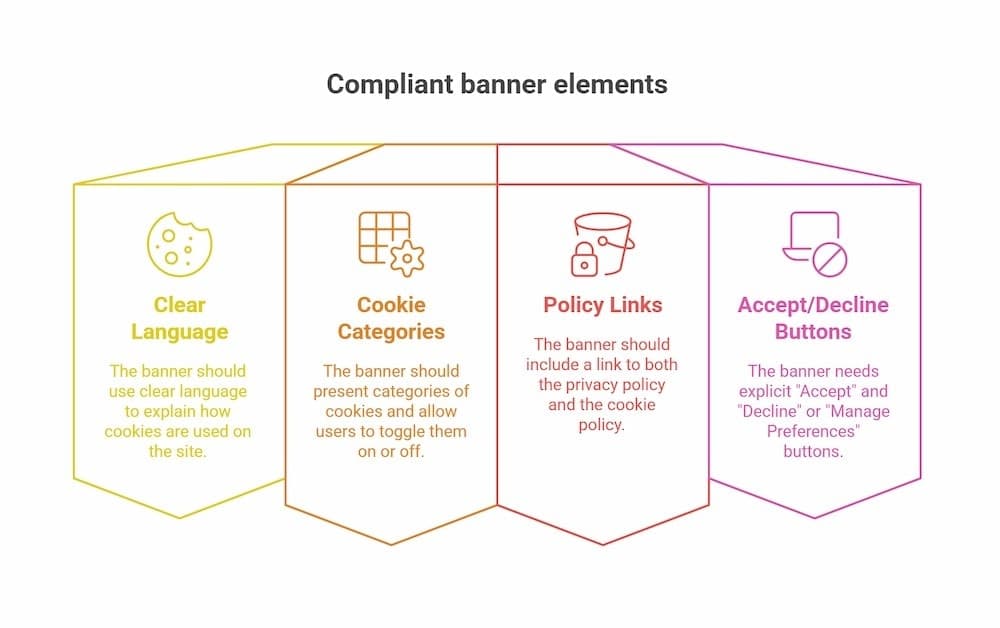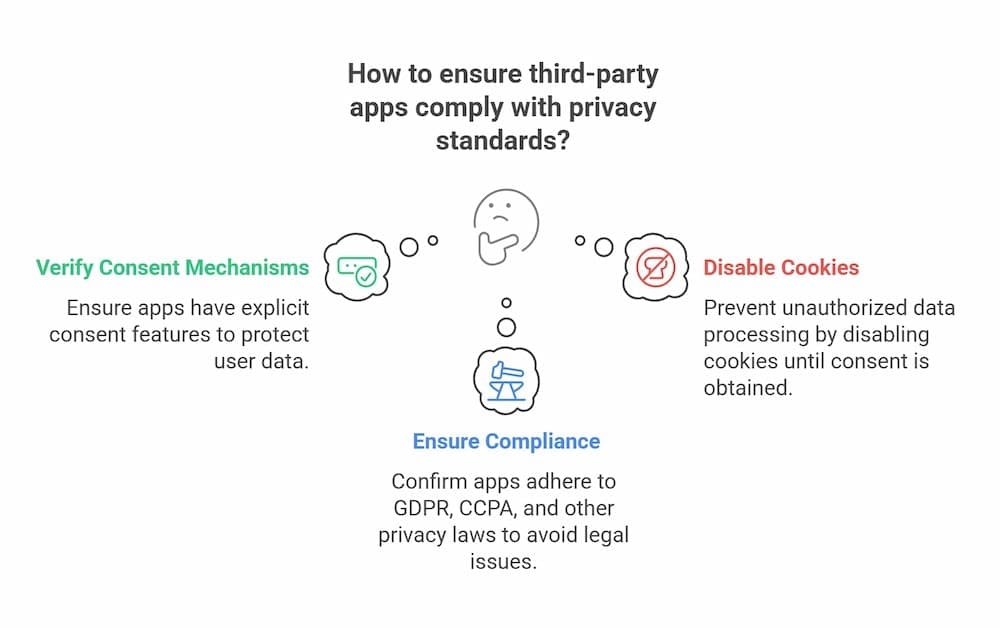Introduction
In 2025, cookie compliance is not just a legal obligation but a fundamental aspect of building customer trust for US Shopify stores. Data privacy laws like the California Consumer Privacy Act (CCPA) and the General Data Protection Regulation (GDPR) have set a high standard for how businesses handle personal data, especially when using cookies for tracking scripts, browsing behavior, and personalization. With global privacy laws evolving rapidly, Shopify merchants operating in the US must ensure their online store meets stringent legal requirements for user consent, data collection, and transparency.
Understanding cookie compliance is essential for Shopify store owners who aim to maintain customer trust, achieve legal compliance, and avoid hefty penalties. These stores must inform users about data practices and obtain explicit consent before storing or accessing cookies. Implementing a compliant cookie consent banner is the foundational step. A Shopify cookie tool or application can help manage consent and compliance within Shopify stores, ensuring that all legal requirements are met efficiently.
A cookie banner enables stores to notify users, obtain user consent preferences, and respect their customer privacy settings. Shopify customer privacy tools and features are available to help merchants manage customer consent and privacy preferences, supporting GDPR and CCPA compliance. Failure to do so could jeopardize not only your online privacy compliance but also your brand’s reputation.
Understanding Cookies and Consent
Cookies are small text files that store information on users’ devices. While some are essential for basic site functionality, others—like advertising and analytics cookies—are non-essential and require user consent under various privacy regulations. These cookies are often used by third-party services to monitor user interaction, personalize experiences, and run targeted Google Ads or Facebook campaigns. Shopify cookies are managed through consent banners that inform users about the cookies in use, obtain their consent, and allow them to manage their cookie preferences to ensure privacy compliance with laws like GDPR and CCPA.
To be GDPR compliant and meet data privacy laws, Shopify stores must inform visitors about the types of cookies used, why they are used, and who has access to the data stored. Consent must be obtained before placing non-essential cookies. This is where cookie consent banners play a pivotal role. They are not merely pop-ups but legally required tools that manage user preferences, collect user consent data, and ensure explicit opt-in mechanisms. Using Google Consent Mode, stores can adjust tracking scripts based on the user’s consent status, which helps in complying with both Google Analytics and data protection laws.
Benefits of Cookie Compliance
Achieving cookie compliance benefits Shopify stores in several ways. Firstly, it builds customer trust by demonstrating transparency around data processing and data collection. Customers are more likely to engage and return to a brand that values their privacy and respects their user consent preferences. This transparency can lead to improved user engagement, higher conversion rates, and long-term customer loyalty.
Secondly, compliance with privacy laws reduces the risk of regulatory fines and reputational damage. Violating the California Consumer Privacy Act or GDPR can result in significant penalties. By maintaining a compliant cookie consent banner, store owners ensure that personal data is collected legally, responsibly, and with user consent. Proper compliance also helps stores continue using vital tools like Google Analytics, Facebook Pixel, and Google Ads without breaching privacy compliance requirements.
Key Challenges in Cookie Compliance
Despite the benefits, maintaining compliance comes with challenges. One major hurdle is understanding the intricate and ever-changing data privacy regulations. From GDPR to CCPA, each jurisdiction imposes different standards for user consent, making it overwhelming for Shopify store owners to keep up with these evolving rules.
Another challenge lies in the technical implementation of compliant cookie banners. Store owners must ensure that cookies are not dropped until explicit consent is obtained. Integrating consent solutions with third-party apps like Google Analytics, Facebook Pixel, and other Shopify App Store offerings adds complexity. Moreover, ensuring that user consent data is recorded, managed, and can be accessed or deleted upon request—known as consent records—requires robust backend systems. Ensuring compliance with all relevant data privacy laws and technical standards is essential, as failure to do so can result in legal and reputational risks. Many businesses operating Shopify stores struggle to find a user-friendly tool that seamlessly handles all these needs.

Setting up a Cookie Banner
A cookie banner is the front line of cookie compliance. It’s a visual prompt that appears on a website to inform users about cookie usage and request their consent. For Shopify merchants, setting up a compliant cookie consent banner is crucial for meeting legal requirements and ensuring transparency. Using a compliant cookie banner is essential to adhere to privacy regulations such as GDPR and CCPA. The banner must be clear, accessible, and offer opt-in and opt-out options.
Shopify store owners can either manually configure banners or use a consent management platform (CMP). Key elements of a compliant banner include:
- Clear language explaining cookie usage
- Categories of cookies with toggle options (e.g., functional, analytics, marketing)
- A link to the privacy policy and cookie policy
- An explicit “Accept” and “Decline” or “Manage Preferences” button
Such banners should appear on the first visit, respect user preferences, and remain compliant across all pages of the e-commerce store.
Implementing a Consent Management Platform
A Consent Management Platform (CMP) automates and streamlines cookie compliance for Shopify stores. A CMP helps store owners collect, manage, and store user consent data in accordance with global data privacy laws. It ensures that cookies are only activated after obtaining explicit consent, which is critical under both GDPR and CCPA.
Using a CMP also enables Shopify store owners to integrate with Google Consent Mode, allowing Google tags and Google Analytics to adapt based on consent choices. A good CMP provides a user-friendly tool for customers to update their user preferences at any time, creating a seamless user experience. This kind of comprehensive privacy management supports ongoing legal compliance, helping stores avoid penalties and maintain user trust.
Consent Mode: Enhancing User Choice and Data Control
Consent Mode is becoming an essential feature for Shopify stores aiming to respect user preferences and comply with data protection laws. By integrating Consent Mode, store owners can ensure their online store aligns with the General Data Protection Regulation (GDPR) and other global privacy laws, providing a robust framework for managing user consent. This feature empowers users to make informed choices about their personal data, giving them greater control over what information is collected and how it is used.
For businesses operating in the European Union and beyond, Consent Mode is a critical tool for staying compliant with evolving privacy laws. It works seamlessly with a consent management platform, allowing Shopify store owners to deploy a compliant cookie consent banner that clearly informs users about data collection and storage practices. By leveraging Consent Mode, store owners can demonstrate their commitment to transparency and user privacy, while also ensuring that their consent banner accurately reflects user preferences and legal requirements. This proactive approach not only helps stores stay compliant but also builds lasting customer trust.
Protecting Customer Data
Protecting customer data is not optional, it’s a mandate under data protection laws and an ethical obligation. Shopify merchants must take measures to secure personal data, including IP addresses, location data, and browsing behavior, collected through cookies. Encrypting data stored, limiting access, and employing security best practices are necessary to avoid breaches.
Furthermore, third-party services must be vetted to ensure they are compliant with privacy laws. Store owners must ensure these services do not process or store customer data without explicit consent. Maintaining customer privacy also involves offering customers the ability to delete their data or withdraw consent, which is critical under both GDPR compliance and CCPA frameworks. Clear customer privacy settings should be integrated into the online store’s interface.
Consent Management
Consent management encompasses the collection, storage, and application of user consent preferences. For Shopify store owners, it involves obtaining explicit opt-in for any non-essential cookies and allowing users to opt out at any time. Without proper consent management, any data gathered from users can be deemed unlawfully collected, leading to fines.
The process should include:
- Recording when and how consent was obtained
- Providing an easy way to update or withdraw consent
- Automatically updating tracking scripts like Facebook Pixel or Google Analytics to reflect these changes
By using a consent banner or CMP, Shopify stores can deliver a personalized experience while staying on the right side of privacy compliance.
Compliance Features for Shopify Stores
Shopify stores have access to multiple tools and compliance features that aid in cookie compliance. These include pre-built cookie banners, CMP integrations, and third-party apps that assist in tracking consent records. Platforms like Google Consent Mode allow for dynamic control of tracking scripts, adapting based on user input.
Key compliance tools:
- Shopify’s built-in customer privacy settings
- Third-party apps from the Shopify App Store for managing cookies and consent
- Custom scripts that control when cookies are fired based on user consent data
These features ensure Shopify merchants remain compliant with evolving regulations, build customer trust, and create a transparent user experience.
Reviewing and Managing Third-Party Apps
Third-party apps often require access to personal data to function properly. However, not all apps are created with privacy compliance in mind. Shopify store owners must routinely audit all apps installed from the Shopify App Store to ensure they only process data with proper user consent.
Best practices include:
- Verifying that the app supports explicit consent mechanisms
- Disabling cookie-related functions until consent is given
- Ensuring the app complies with GDPR, CCPA, and other global privacy laws
Regular reviews help businesses stay compliant and mitigate the risk of unauthorized data processing. Consent management tools can help control how these apps access customer data and whether they are using data stored in alignment with data privacy regulations.

Best Practices for Cookie Compliance
To achieve and maintain cookie compliance, Shopify store owners should adopt a set of best practices that prioritize transparency, user choice, and ongoing adaptation to evolving regulations. Start by implementing a compliant cookie consent banner that is clear, accessible, and easy for users to interact with. The cookie banner should provide detailed information about data collection practices and offer straightforward opt-out options for non-essential cookies.
Regularly reviewing and updating your cookie policy is essential to ensure it reflects the latest data protection laws and privacy regulations. Make sure your consent banner is user-friendly, allowing visitors to easily manage their preferences and understand how their data will be used. By following these best practices, Shopify store owners can demonstrate a strong commitment to customer privacy, foster trust, and ensure ongoing compliance with data protection laws.
Pandectes: The Top Shopify Compliance App for 2025
In 2025, Pandectes GDPR Compliance stands out as the all-in-one solution for Shopify store owners focused on achieving and maintaining cookie compliance and data protection. As the most highly rated app in its category, Pandectes offers a robust set of features specifically designed to help Shopify merchants stay compliant with global privacy regulations like the California Consumer Privacy Act (CCPA), General Data Protection Regulation (GDPR), and other evolving laws.
Pandectes provides:
- A fully customizable, Google Consent Mode v2-compatible cookie consent banner.
- Built-in support for Google Analytics, Google Ads, and Facebook Pixel, ensuring third-party tracking scripts operate only with valid user consent.
- Seamless automation of consent records, including opt-in and opt-out choices, for transparent and compliant user consent management.
- Integration with Shopify’s Customer Privacy API for accurate, real-time consent processing.
Recognized as a Best Value App by Capterra in 2025, Pandectes has proven to be an essential privacy compliance tool for Shopify merchants worldwide. By focusing on user consent data, data privacy laws, and a seamless user experience, Pandectes helps store owners build customer trust and avoid costly compliance errors.
Mistakes to Avoid in Cookie Compliance
Several pitfalls can hinder cookie compliance. One of the most common mistakes is failing to obtain explicit consent before placing non-essential cookies. Many stores still assume that implied consent is sufficient, which is no longer acceptable under most privacy laws.
Other mistakes include:
- Not offering opt-out options or only providing them in hard-to-find locations
- Using third-party services that aren’t compliant with current data privacy laws
- Forgetting to log consent records or allow users to manage their user preferences
- Lack of transparency in cookie banners or failing to update them as privacy regulations evolve
By avoiding these issues, Shopify store owners can ensure basic compliance and uphold a high standard of customer privacy.
Future of Cookie Compliance for Shopify Stores
Looking ahead, the future of cookie compliance for Shopify stores will be shaped by a growing emphasis on user consent and data control. As data protection laws continue to evolve, store owners will need to adopt more advanced cookie management tools that offer granular control over data collection and user consent data. Transparency and accountability will become even more important, with customers expecting clear information about how their data is used and the ability to easily opt out of non-essential cookies.
To ensure compliance, Shopify store owners must stay informed about changes in privacy laws and proactively update their policies and practices. By embracing new technologies and prioritizing customer privacy, online stores can maintain a strong reputation, build lasting customer relationships, and navigate the complexities of global data protection laws with confidence.
Conclusion
In 2025, cookie compliance is a necessity for any Shopify store operating in the US or serving European customers. With strict privacy regulations like the California Consumer Privacy Act and General Data Protection Regulation, businesses must prioritize user privacy and build robust systems to manage cookies, gather user consent, and implement compliant cookie consent banners.
Using tools like Google Consent Mode, Consent Management Platforms, and proper cookie banners, Shopify merchants can maintain online privacy, increase user engagement, and ensure legal compliance. Staying ahead of evolving regulations, regularly reviewing third-party apps, and maintaining strong data protection practices are essential for any e-commerce store to thrive in today’s data-conscious environment.



